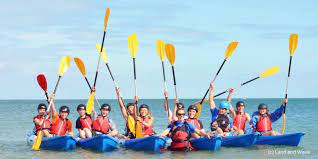Introduction:
An educational visits coordinator (EVC) plays a crucial role in planning, organizing, and facilitating educational field trips for students. These excursions help students experience learning beyond the classroom walls and provide them with interactive and engaging opportunities to acquire knowledge. To ensure the success of these educational trips, a good EVC must possess a specific skill set.
This article aims to provide insight into the key abilities and characteristics required to become an effective educational visits coordinator.
1. Excellent Organizational Skills:
An EVC must demonstrate top-notch organizational skills to ensure arrangements are made for transporting students, liaising with various venues and coordinating logistics such as accommodation and meals. They must maintain up-to-date records, coordinate with teachers and facilitators, and have contingency plans in place in case of unexpected situations.
2. Strong Communication Abilities:
Effective communication is crucial for an EVC. They should be able to communicate clearly with both internal staff members, including fellow educators and administrators, as well as external contacts such as venue representatives, tour guides, and bus companies. This involves providing clear instructions, being responsive to questions or concerns, and keeping everyone informed throughout the process.
3. Risk Assessment Skills:
As an EVC, ensuring the safety of students is paramount. This includes conducting thorough risk assessments before embarking on trips to identify potential hazards and mitigate any associated risks effectively.
4. Capacity to Create Engaging Itineraries:
An excellent EVC can create itineraries that are both engaging and educationally valuable, catering to the varied interests of the students involved. This involves conducting research into suitable destinations or experiences while considering factors like age appropriateness and curriculum relevance.
5. Flexibility & Adaptability:
An EVC must be flexible and adaptable as unforeseen situations can often arise during field trips. They must be able to adjust plans accordingly while maintaining composure in order to make the best out of any situation.
6. Networking Skills:
Building relationships with various vendors and contacts is vital for an EVC to secure the best deals, venues, and experiences for educational trips. Hence, networking and relationship-building skills are essential to expand their list of resources and options for future excursions.
7. Time Management Skills:
Coordinating educational visits requires impeccable time management skills. An EVC must be able to prioritize tasks effectively, meet deadlines and juggle various responsibilities without compromising the quality or safety of the trip.
8. Passion for Education:
An effective EVC is passionate about education and understands the significance of providing learning experiences outside of the classroom. They should be committed to creating memorable and valuable experiences for students while aligning the objectives with the curriculum.
Conclusion:
An effective educational visits coordinator can make a real difference in students’ lives by providing engaging, unique learning experiences that enrich their education. By mastering these key skills and qualities, an EVC can ensure that every field trip is an unforgettable journey of exploration and discovery for all those involved.





